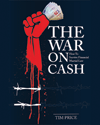How to prepare for financial chaos
The War on Cash: How to Survive Financial Martial Law Tim Price's new book on how to survive a financial crash is certainly provocative, says Matthew Partridge. But these are no idle musings.

Get the latest financial news, insights and expert analysis from our award-winning MoneyWeek team, to help you understand what really matters when it comes to your finances.
You are now subscribed
Your newsletter sign-up was successful
Want to add more newsletters?

Published by MoneyWeek Research
Thanks to low interest rates, quantitative easing (QE) and the bank bail-outs, today's investors have witnessed one of the longest equity bull markets ever. If you had bought the S&P 500 in March 2009 and sold this summer, you would have more than tripled your money. Those buying the FTSE 100 would have seen their investment nearly double over the same period. In both the UK and the US, unemployment is back down to "normal" levels, while "real" (after-inflation) wages are rising.
But have we grown too complacent? Regular MoneyWeek contributor and wealth manager Tim Price certainly thinks so. His new book explains exactly why he thinks the recovery is fake and why something even worse than 2008 lies ahead. The War on Cash: How to Survive Financial Martial Law is split into three sections. The opening chunk argues that, while QE temporarily saved the banks and boosted asset prices, it did so at the expense of creating a mountain of debt, making the financial system vulnerable to an even bigger crash.
Try 6 free issues of MoneyWeek today
Get unparalleled financial insight, analysis and expert opinion you can profit from.

Sign up to Money Morning
Don't miss the latest investment and personal finances news, market analysis, plus money-saving tips with our free twice-daily newsletter
Don't miss the latest investment and personal finances news, market analysis, plus money-saving tips with our free twice-daily newsletter
The second part of the book looks at how this could unfold. Price sees governments resorting to ever more desperate measures, including negative interest rates (already set by central banks across most of Europe, with some Swiss banks even charging negative rates on deposits) and competitive devaluations currency wars to keep things going. However, this will only delay the crash. In fact, by pushing asset prices so high, the authorities may simply ensure that the fall in Britain, US and Europe is even more spectacular than it would otherwise have been.
So how can you protect yourself? This is where the last section comes in. Price advocates a "cockroach" strategy investing to survive. This means a focus on liquid assets, including cash, which can be easily accessed if the financial system starts to break down. The risk is that the government may implement various forms of capital controls to thwart this for example, the Bank of England's chief economist Andy Haldane recently suggested it might be "efficient" to abolish physical currency.
Price's arguments are provocative, and they're not ones you're likely to have read in more mainstream financial sources. But they are no idle musings he backs his case with relentless logic and plenty of charts and data. He also has a knack for finding anecdotes that sum up market lunacy such as the tale of a recent attempt to list a Yeti-hunting company in the US. Indeed, despite the grim topic matter, it's often very entertaining.
In short, The War on Cash will forceyou to question much of the conventional market wisdom and it is short and punchy enough to get through in a single sitting. While you may not agree with all of Price's analysis, as an investor, it is certainly worth understanding what a worst-case scenario might hold.
Get the latest financial news, insights and expert analysis from our award-winning MoneyWeek team, to help you understand what really matters when it comes to your finances.

-
 The rare books which are selling for thousands
The rare books which are selling for thousandsRare books have been given a boost by the film Wuthering Heights. So how much are they really selling for?
-
 Pensions vs savings accounts: which is better for building wealth?
Pensions vs savings accounts: which is better for building wealth?Savings accounts with inflation-beating interest rates are a safe place to grow your money, but could you get bigger gains by putting your cash into a pension?